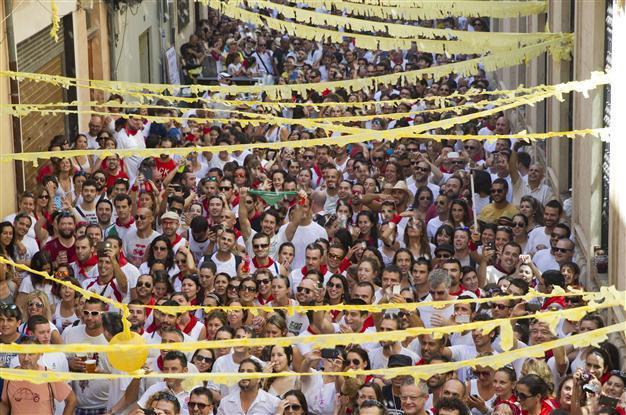Huge crowds launch Spain's Pamplona bull-run festival
PAMPLONA, Spain - Agence France-Presse

Revelers take part in celebrations of the San Fermin during a festival in Palma de Mallorca on July 5, 2014, on the eve of the San Fermin Festival. Each year the Bar Espana mimics Pamplona's events and organizes a humorous "Chupinazo" in Palma. AFP Photo
A red-and-white sea of revellers soaked each other with wine in a packed Pamplona square on Sunday to kick off Spain's most famous fiesta, the San Fermin bull-running festival.A shout from the City Hall balcony of "Viva San Fermin!" and the lighting of a firecracker known as the "chupinazo" at noon (1000 GMT) set off the bedlam, which marks the official start of the nine-day street party.
Masses of fun-seekers from around the world squeezed into the square under an overcast sky cheered, danced and sprayed each other with sangria and cheap wine, turning white shirts to pink.
The crowds, dressed in traditional white outfits and red neck scarves, passed large yellow and white inflatable balls over their heads as scores looked down from crowded apartment balconies.
Sam Madden, a 26-year-old electrician, came from London with a friend to take part in a bull run.
"We don't know what to expect, if we are going to die or what. It's cool, it's going to be crazy. We know it can be dangerous but we have to do it for a bit of adrenaline," he said.
The festival in honour of Saint Fermin, the first bishop of Pamplona, dates back to medieval times and features religious processions, folk dancing, concerts and round-the-clock drinking.
But the highlight is a bracing daily test of courage against a thundering pack of half-tonne fighting bulls through the city's cobbled streets.
Each day at 8:00 am hundreds of people race with six huge bulls, charging along a winding, 848.6-metre (more than half a mile) course through narrow streets to the city's bull ring, where the animals are killed in a bullfight.
The bravest -- or most foolhardy -- run as close as possible to the tips of the horns while trying to avoid being gored.
The first bull run, which traditionally draws the largest number of participants, is on Monday. A run takes on average just under four minutes.
Last year 50 people were taken to hospital at the festival's eight runs, including 23 revellers caught in a bloody human pile-up on the final day of the fiesta.
Several hundred more were treated for minor injuries at the scene.
Most injuries are not caused by bull horns but by runners falling, or being knocked over or trampled by the animals.
Fifteen people have been killed in the bull runs since records started in 1911.
The most recent death took place four years ago when a bull gored a 27-year-old Spaniard in the neck, heart and lungs.
Pamplona city hall has this year introduced fines of up to 60,000 euros ($82,000) for those that violate rules intended to minimize the risk of the bull runs.
Using a camera during a bull run or taking part while drunk are among the acts prohibited under a new city ordinance.
"We have a problem since there are people who enter the bull run who don't really know what a bull run is," Pamplona city councillor Fermin Alonso, who is responsible for cultural activities, told AFP.
"Pamplona police have to remove from the course drunk people, people who wear sandals instead of running shoes. To correct these situations we have established some norms and fines."
The city of 300,000 residents expects the festival, made famous worldwide by Ernest Hemingway's 1926 novel "The Sun Also Rises", will draw between 750,000 and over one million visitors.
Ana Caroaizcorbe, 43, has returned to the festival for the first time since she was a child.
"It seems much more massive now... but the bull runs, the religious acts, I think they still have a traditional character," she said.
Over 150 animal rights campaigners daubed themselves in fake blood and stood in Pamplona's main square on Saturday holding signs that read in several languages: "You Run. Bulls Die."
















